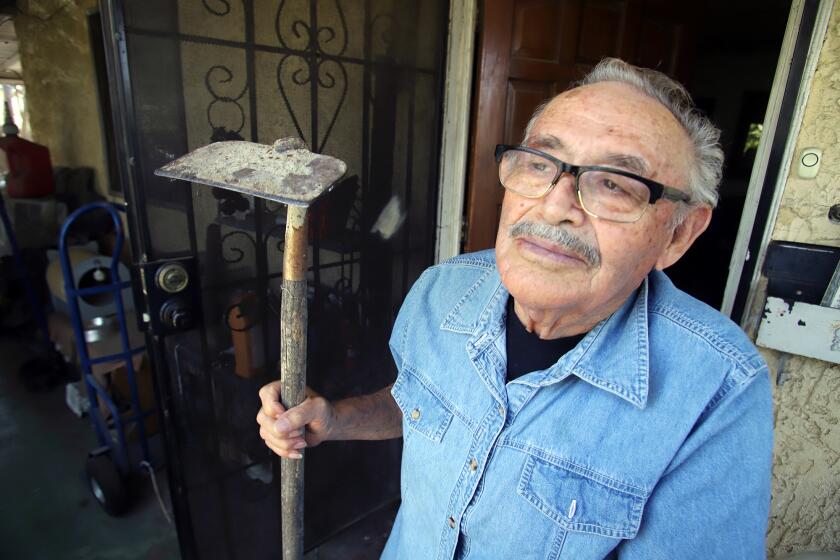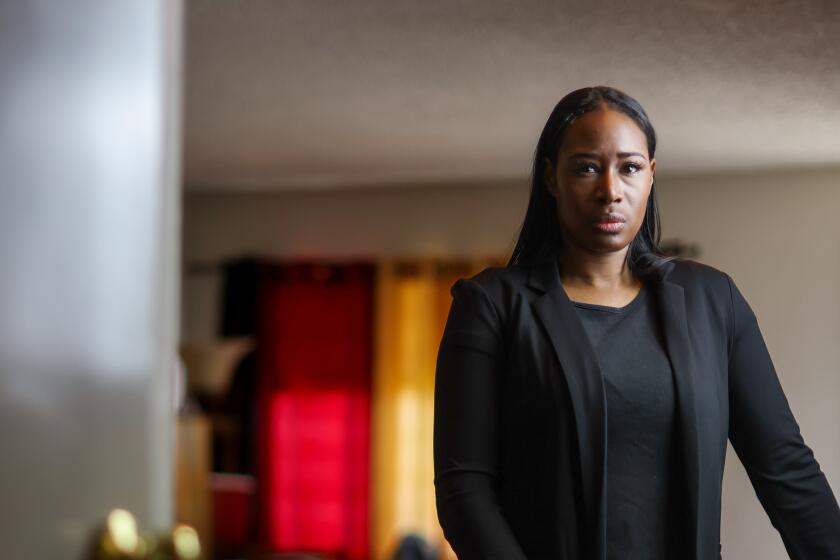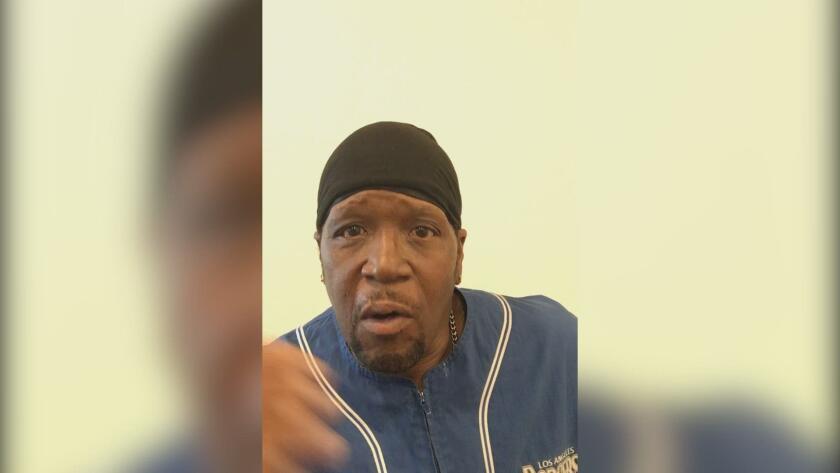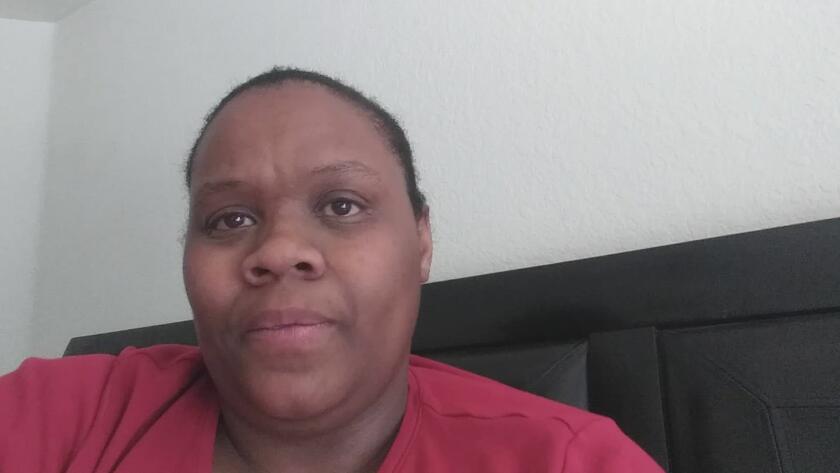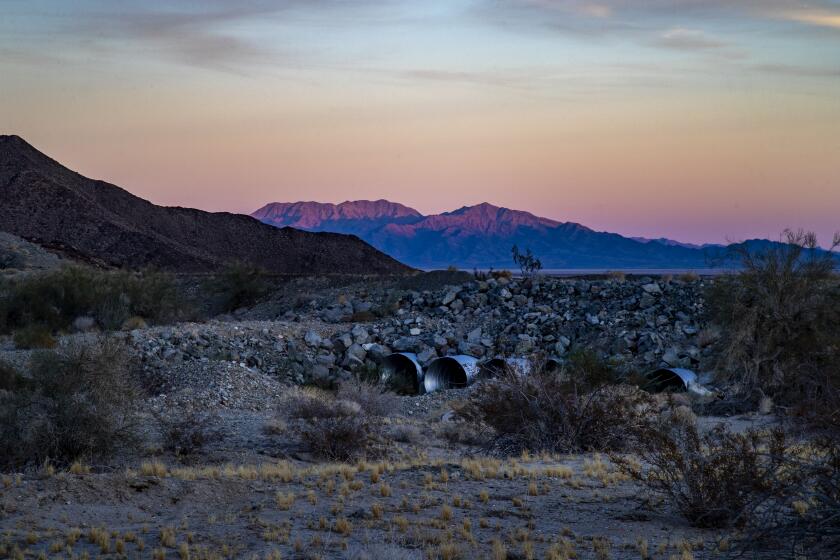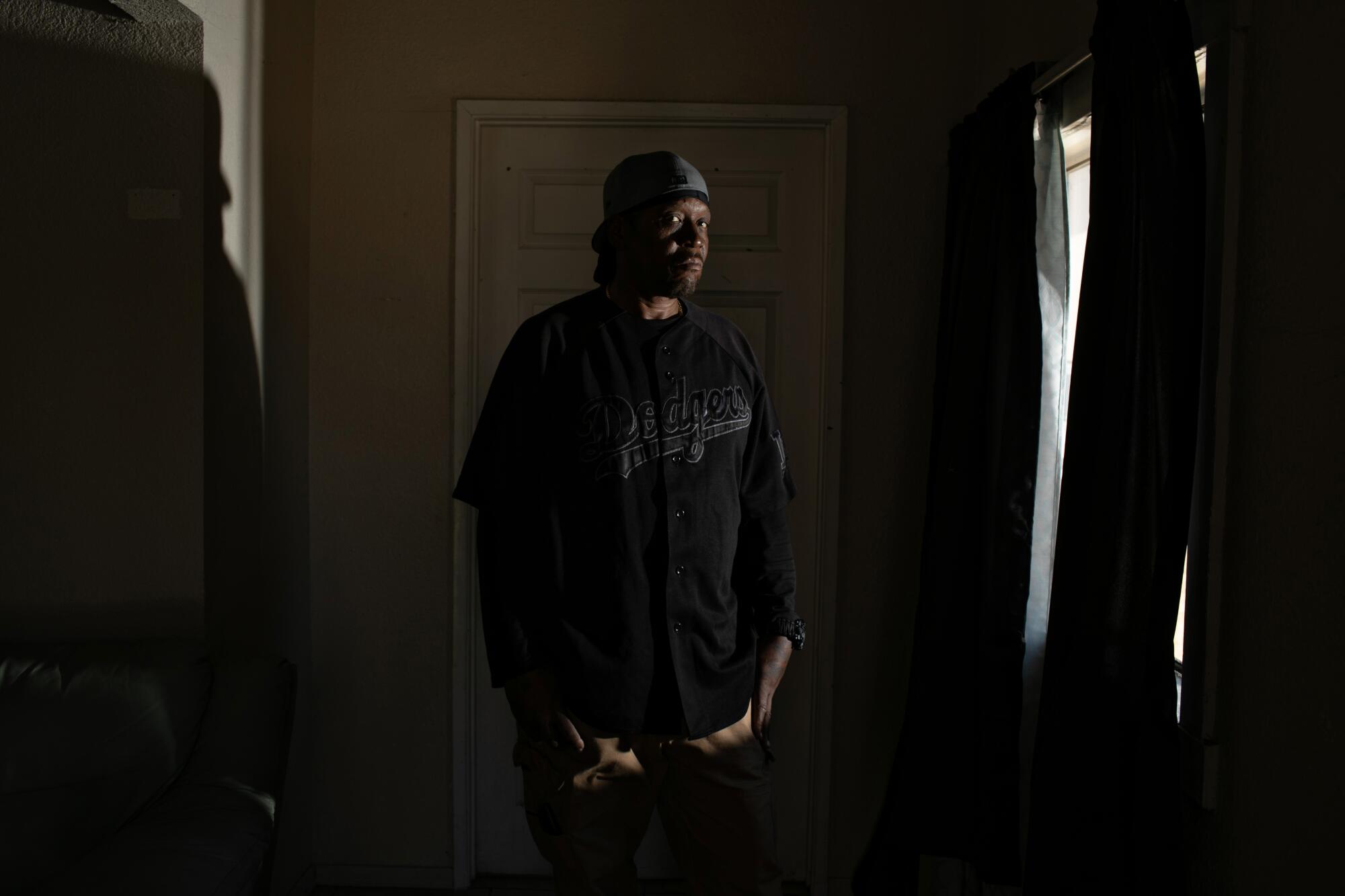
Nearly every day, the onetime Ontario warehouse employee said, he was stunned to hear racist slurs from Latino co-workers.
“They said it in English — they said it in Spanish all the time,” recalled Leon Simmons, a Black father of four with a deep voice and gentle manner. “When they look you right in the eye and call you the N-word to your face, that’s dehumanizing.”
Thirty-two miles away at a Moreno Valley warehouse, it was the same story. Another Black laborer, Benjamin Watkins, described how a Latina co-worker called to him: “‘Hey, monkey! Yeah, you!’ and waved a banana in her hand. A group of women burst out laughing.”
In America’s long history, harassment and discrimination against Black workers has usually involved white perpetrators — and that remains the case today. But with the rapid growth of the Latino population, now at 19% in the U.S. and 39% in California, Latinos form the majority in many low-wage workplaces. And instances of anti-Black bias and colorism among them is drawing new scrutiny, even as activists in the two communities forge alliances over criminal justice and economic development.
Latinos certainly are targets of job discrimination as well and continue to struggle for equity in the workplace. But the two largest racial bias cases brought by the federal government in California in the last decade alleged widespread abuse of hundreds of Black employees at warehouses in the Inland Empire, the state’s booming distribution hub for trade between the U.S. and Asia.
In interviews, Black employees said a torrent of racist insults and discriminatory treatment was mainly inflicted by Latino co-workers and supervisors who composed roughly three-quarters of the workforces at the sprawling facilities in Ontario and Moreno Valley.
“Mayate,” a type of beetle and Spanish slang for the N-word, was a common taunt, according to interviews and court filings.
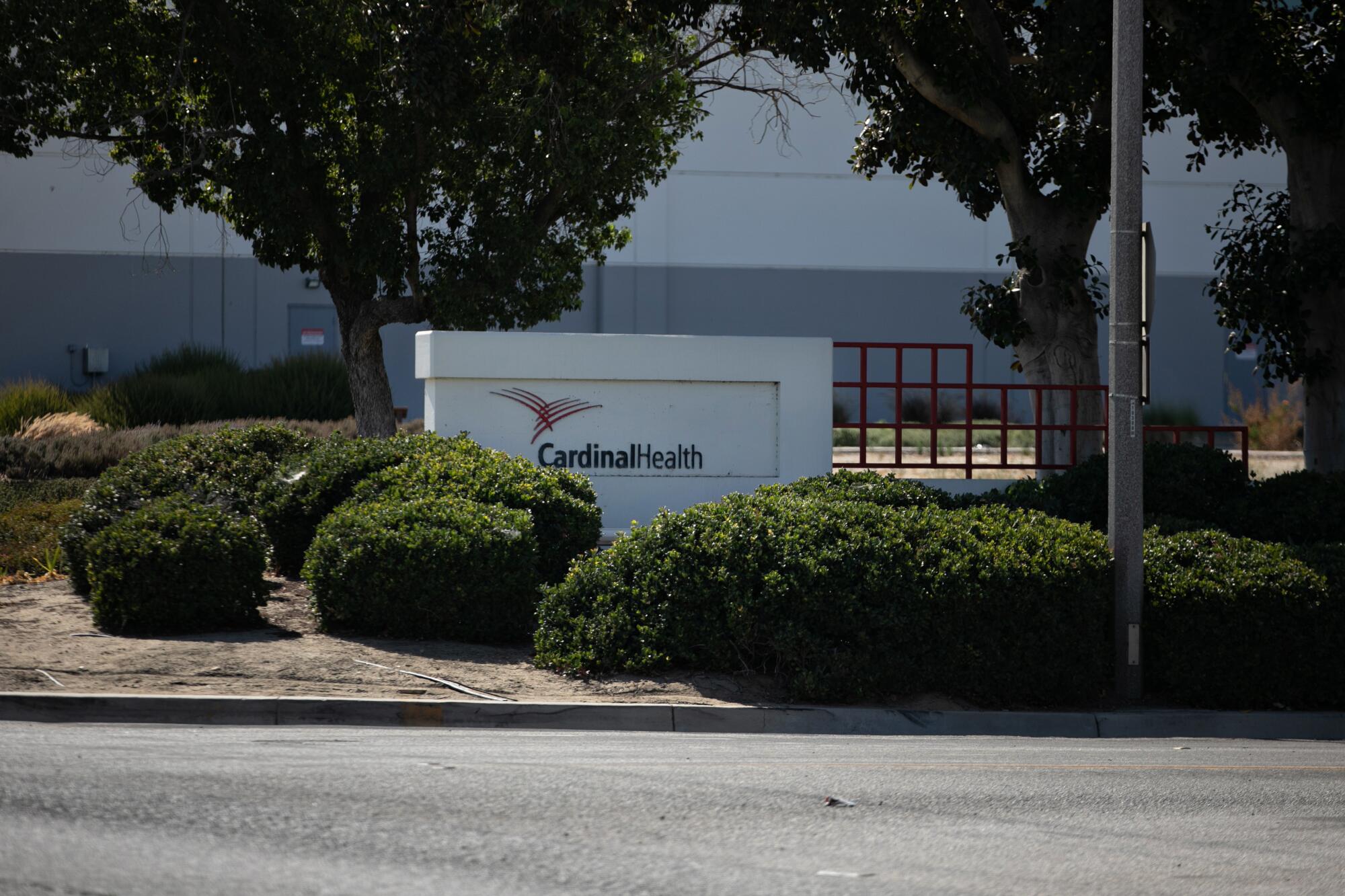
U.S. Equal Employment Opportunity Commission lawsuits alleged that supervisors at the global medical supplier Cardinal Health and at Ryder Integrated Logistics, a subsidiary of the trucking giant — along with their staffing firms — routinely ignored harassment in Spanish and English at their Inland Empire warehouses. They gave Black employees the hardest manual jobs, denied them training and promotions and failed to take action despite dozens of complaints, according to court filings and interviews.
Many of the Black workers were hired through temp agencies. When they complained, managers — both white and Latino — retaliated by disciplining them or abruptly firing them, according to the EEOC. Others felt forced to quit because of “intolerable working conditions created by the hostile work environment,” the lawsuits alleged.
Cardinal, Ryder and their temp firms denied the accusations. But as scores of Black employees came forward and the EEOC interviewed witnesses, the companies settled the cases last year rather than face jury trials.
“We are seeing an increase in larger race harassment cases,” said Anna Park, regional attorney for the EEOC’s Los Angeles district office. “The nature of them has gotten uglier. There’s a more blatant display of hatred with the N-word, with imagery, with nooses. All the violence you’re seeing in the news, it is manifesting in the employment context.”
In a state as diverse as California, offenders span all races and ethnicities, she said.
A former farmworker wants to play a role in exposing, and ending, the long history of racism, wage theft and mistreatment.
“Two decades ago discrimination was viewed as a Black-white paradigm,” Park said. “The feeling was minorities can’t be discriminating. But it could be Asians discriminating, it could be Latinos discriminating. Regardless of what color you are, you don’t get a free pass.”
Now about 300 Black workers are gaining compensation, some as much as tens of thousands of dollars, through the Inland Empire settlements. Cardinal agreed to pay $1.45 million. Ryder and Kimco Staffing Services, which supplied workers to Ryder, settled for $1 million each.
The warehouse operators and their staffing firms — including a Glendale temp agency, AppleOne, which supplied workers to Cardinal — must offer extensive harassment training in English and Spanish and submit to stringent monitoring for verbal abuse, bias and retaliation.
The Los Angeles Times contacted more than two dozen current and former Latino workers from Cardinal and Ryder. None agreed to an interview.
Nationwide, EEOC records show prejudice can afflict any race or ethnicity, but Black victims predominate.
Over the last decade, the agency has won settlements in 171 race discrimination suits involving Black workers, 59 cases involving Latino victims, 12 involving Asian victims and six involving white victims.
Though the agency tracks the race and ethnicity of victims, it does not compile official statistics on offenders. Nor are there databases of private cases categorized by perpetrators’ race. This makes it hard to gauge the extent of anti-Black hostility from Latino workers.
But court filings, victims’ allegations and employer records show that in the last decade, about a third of anti-Black bias suits filed by the EEOC’s Los Angeles and San Francisco offices involved discrimination by Latinos, about a third involved white offenders and a third were unspecific.
The suit against Cardinal Health and AppleOne was graphic.
Since at least 2016, the EEOC alleged, Black workers were subjected to the N-word by co-workers and managers “many times per day…including ‘n— bitch’, ‘lazy ass n— ain’t did no work all day,’ and ‘Look at those n—looking like monkeys, working like slaves like they should be.’”
The first worker to file a complaint described being called anti-Black slurs in English and Spanish, facing prejudice from a Latina supervisor and being deliberately run over with a cart by a Latino co-worker.
Photos taken by Black workers showed a women’s restroom defaced with graffiti: “N— stink up the aisles” and “Black pipo stink.” A men’s restroom was defaced with “n—killer.”
In a court filing, Cardinal acknowledged “derogatory graffiti,” but said it was promptly removed. A spokesman declined to address other worker allegations, citing the EEOC’s post-settlement statement: “Cardinal Health and AppleOne have put in place measures aimed at preventing discrimination and harassment.”
AppleOne, which placed 1,000 workers at Cardinal over two years, said in a statement it “did not control the workplace” but has implemented “improvements” to its policies ordered by the EEOC.
In their own words, former Tesla employees describe what they call a racist work environment that led California to file a civil rights lawsuit against the company.
On a sunny morning in Rialto, Simmons, wearing a dashiki revealing forearm tattoos of a mermaid and a panther, was perplexed that the abuse at Cardinal Health had come from Latino colleagues. He choked up as he described his ordeal.
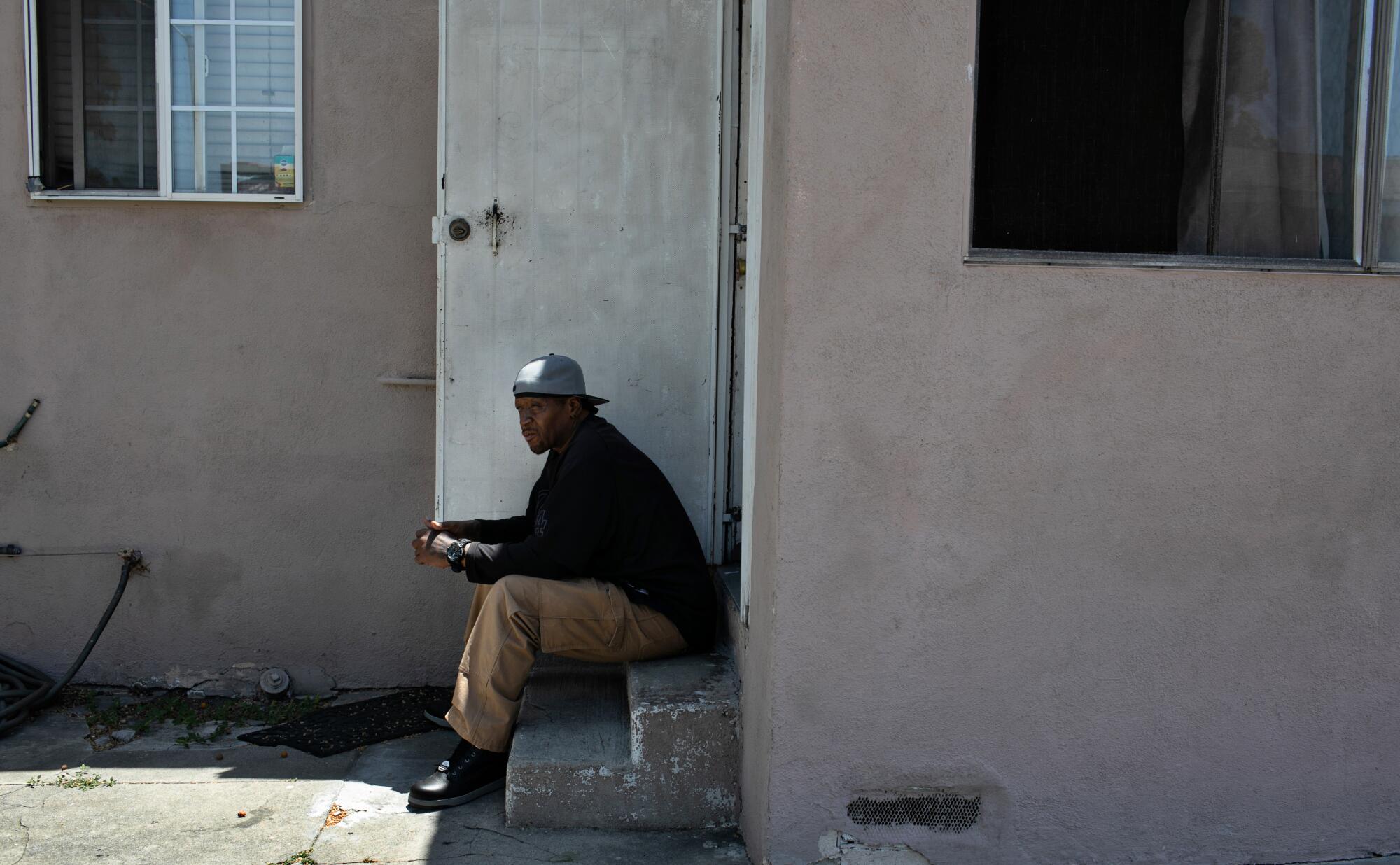
Growing up in Compton, Simmons had Mexican American friends. And over decades at other jobs — forklift driver, custodian, security guard — “Hispanics, whether they liked you or not, they kept it to themselves,” he said. As for the few white workers at Cardinal Health, “Never no problem with them,” he said.
AppleOne hired him to drive a cherry picker at Cardinal for $14 an hour, but he found Black workers were largely kept off the vehicles. Those jobs were given to less experienced Latino workers, even when licensed Black workers were first in line, he said.
Instead, Simmons, in his mid-50s, was given a harder floor picker job for $12 an hour, on his feet loading boxes headed for Kaiser Permanente hospitals. Temperatures inside the warehouse often rose past 90 degrees, he said.
It was six days a week, 14 to 16 hours a day, including mandatory overtime. He saw Latino workers clocking out after eight to 10 hours, but when Black workers asked to leave after 14 hours, they were often threatened with termination, Simmons said.
Leon Simmons voices his frustration with the racism he endured while working for Cardinal Health.
A Latino supervisor “would make me clean up the trash while everybody else was sent home.”
After three months of complaining, Simmons was allowed to drive a cherry picker, but his pay remained at $12 an hour, he said, lower than that of non-Black drivers.
He grew angry and despondent: “They’d write stuff on the bathroom walls — ‘gorillas, go back to Africa.’ The Black workers would cross it out. Two days later, it would be right back.”
Simmons complained to AppleOne and Cardinal managers, he said. “But nobody investigated. Nobody cared.” His Latina supervisor said, “If you’re up here complaining, the orders are not getting picked.”
Cardinal officials testified they received complaints about racial slurs, including graffiti with the N-word, but some emails documenting complaints and their responses were erased due to an auto deletion policy, even after EEOC charges were filed.
Black workers who complained “started disappearing one by one,” Simmons said. “We’d find out they were fired.” After 11 months, he too was told “your assignment is over.” No reason was given, he said.
By then, Simmons had started going to a psychologist. During visits, “I’d start shaking and crying,” he said. He was put on antidepressants.
Simmons got another job as a security guard but had to quit. The racism at Cardinal, he said, “messed me up. Something popped in my head. I was still having night terrors — waking up screaming.”
Today, diagnosed with PTSD, Simmons is on disability.
Anti-Black prejudice in Latino-dominated workplaces comes as no surprise to scholars of race relations. Tensions between Latinos and Black Americans have ebbed and flowed in Southern California over decades. Researchers point to a shared legacy of slavery in the U.S. and Latin America. An estimated 15 times more enslaved Africans were taken to Spanish and Portuguese colonies than to North America.
Latino attitudes toward Black Americans can be “tied not only to racism but to colorism,” said Pew Research Center analyst Ana Gonzalez-Barrera, an issue that also arises among other races. “It goes back to colonial history’s caste system. White Spaniards were at the top. Blacks and Indigenous at the bottom. And racial mixtures in between.”
In a 2021 survey, Pew asked U.S. Latinos how they identify themselves on a spectrum of skin color from light to dark, and how skin color shapes their daily lives. Four in 10 of those with darker skin said they experienced discrimination or unfair treatment by another Latino — the same portion who reported discrimination by a non-Latino. Nearly half said they heard racist comments from friends and family about other Latinos.
Latinxs with darker skin faced prejudice from other Latinxs nearly twice as much as those with lighter skin, a new survey found.
“Some Latinos identify as white, or are seen as white,” Gonzalez-Barrera said. “Latinos are a complex community — not one community but many.”
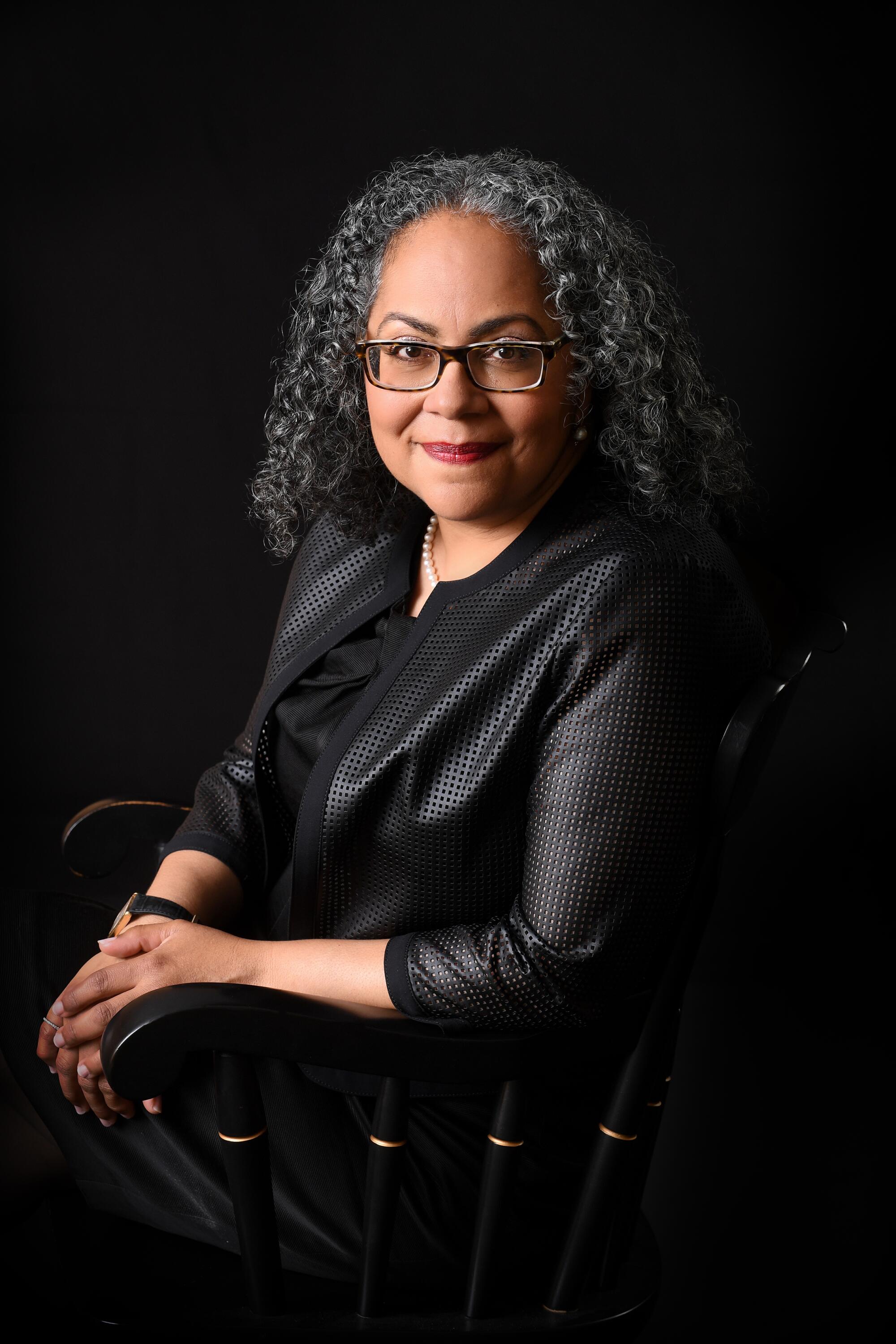
For a forthcoming book, “Racial Innocence: Unmasking Latino Anti-Black Bias and the Struggle for Equality,” Tanya Kateri Hernandez, a Fordham University law professor, combed through legal records, interviewed U.S. civil rights leaders and attorneys and traced the history of Latino workplace discrimination against Black people, including Afro-Latinos, highlighting scores of court cases.
“Anti-Blackness is a global phenomenon,” said Hernandez, who is Afro-Latina. “It’s an uncomfortable truth, but belief in racial hierarchy is common in Latino communities like it is in others.”
Her scholarship focuses on the issue, she said, because “opening our eyes to ways Latinos are implicated is a huge step in trying to eradicate racism.”
Manuel Pastor, director of USC’s Dornsife Equity Research Institute, suggested that tensions can flare between Latinos and Black Americans partly because they compete against each other in low-wage labor markets more than against white or Asian workers.
But, Pastor said, the extent of workplace bias is debatable given “so many instances of Latino and Black workers in relationships of respect.”
At unionized workplaces, labor leaders are working to bring Black and brown employees together to push for better treatment, he said. Many warehouses like Cardinal’s and Ryder’s are nonunion sites with large temp workforces, where employees lack advocates in the event of abuses.
In a recent book, “South Central Dreams: Finding Home and Building Community in South L.A.,” Pastor and co-author Pierrette Hondagneu-Sotelo point to growing interracial acceptance and political coalitions when Black and brown residents live in close proximity.
In the Inland Empire, the Warehouse Worker Resource Center is organizing across racial and ethnic lines to push for labor law enforcement. In Los Angeles, nonprofits such as the Community Coalition have built Black and Latino alliances to address racial disparities. The Los Angeles Black Worker Center joined with the majority-Latino Clean Carwash Worker Center to support each other’s economic justice campaigns.
“The fate of Black people and the fate of immigrant people are linked in the fight against exclusion and exploitation,” said Lola Smallwood-Cuevas, a Black Worker Center co-founder. “As we look at schools, jobs, housing, the last thing our communities need is to be divided and fighting each other.”
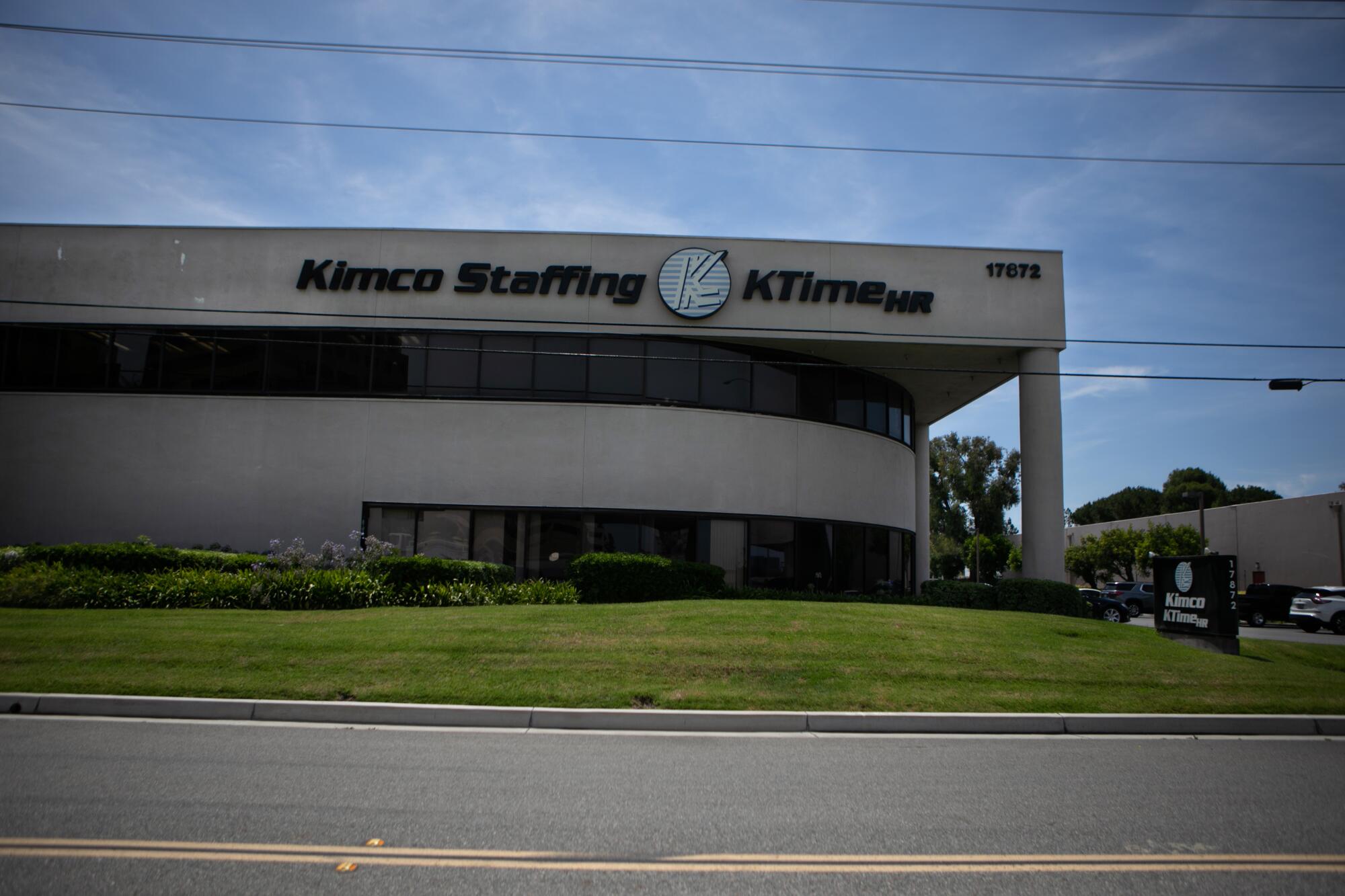
EEOC’s lawsuit against Ryder and Kimco Staffing was similar to that against Cardinal Health and AppleOne. At Ryder’s warehouse, where assemblers packed and shipped medical supplies, Black employees were subjected daily to such slurs as the N-word, “Aunt Jemima,” “negra fea” (ugly Black woman), “cochina,” (pig) and ”cucaracha,” (cockroach), according to the lawsuit.
Black workers described restroom graffiti of a person hanging by a noose, according to the EEOC, and a Latina supervisor who would pull Black workers off the production line to “clean the cracks in the floor.”
In the wake of the suit, a Ryder investigation found that several Ryder and Kimco employees had used anti-Black epithets and that managers failed to report or document complaints, Ryder acknowledged in a court filing. But the companies denied any widespread issues with discrimination, harassment or retaliation.
A Ryder spokeswoman declined to answer questions, instead citing its statement last year blaming Kimco, which had placed 2,500 workers at the facility over three years.
“The claims in this particular case arose out of unfortunate events between employees of a former staffing vendor,” it said. “While Ryder management was not involved... we are taking responsibility because the alleged conduct occurred on our premises.”
Kimco did not respond to requests for comment.
For entrepreneurs of color and women of all races, venture funding remains a nearly impenetrable barrier to success. New players are trying to change that.
Watkins, a soft-spoken, bespectacled 33-year-old, said he often heard slurs in English and Spanish during four years at Ryder. “Hispanic workers had their own production lines, the Black workers had to be on a different line,” he said — a setup described to the EEOC by dozens of others.
A former Ryder supervisor, Royce Yamaguchi, who is of Asian and Caucasian descent, said 90% of assembly leads were Latino and would pick Latino workers to be on their lines, often excluding Black workers. Spanish was the dominant language in the warehouse and Latinos were favored for promotions, he said. Black workers were rarely given jobs that could lead to advancement, Yamaguchi said, and some complained to him about being called “monkey,” and “boy” by Latino colleagues.
In videotaped testimony, Watkins said Latino supervisors often wouldn’t let the Black workers get water or take bathroom breaks. “They’d say, ‘You’re big and Black, you can keep working,’” he recalled.
Watkins sought to move from temporary to permanent status. “My supervisors had me training the new employees and then I would see the new Hispanic temps be promoted to permanent,” he said. “They didn’t even consider me.”
Finally, he quit. The treatment, he said, “made me feel ... like I wasn’t a human being.”
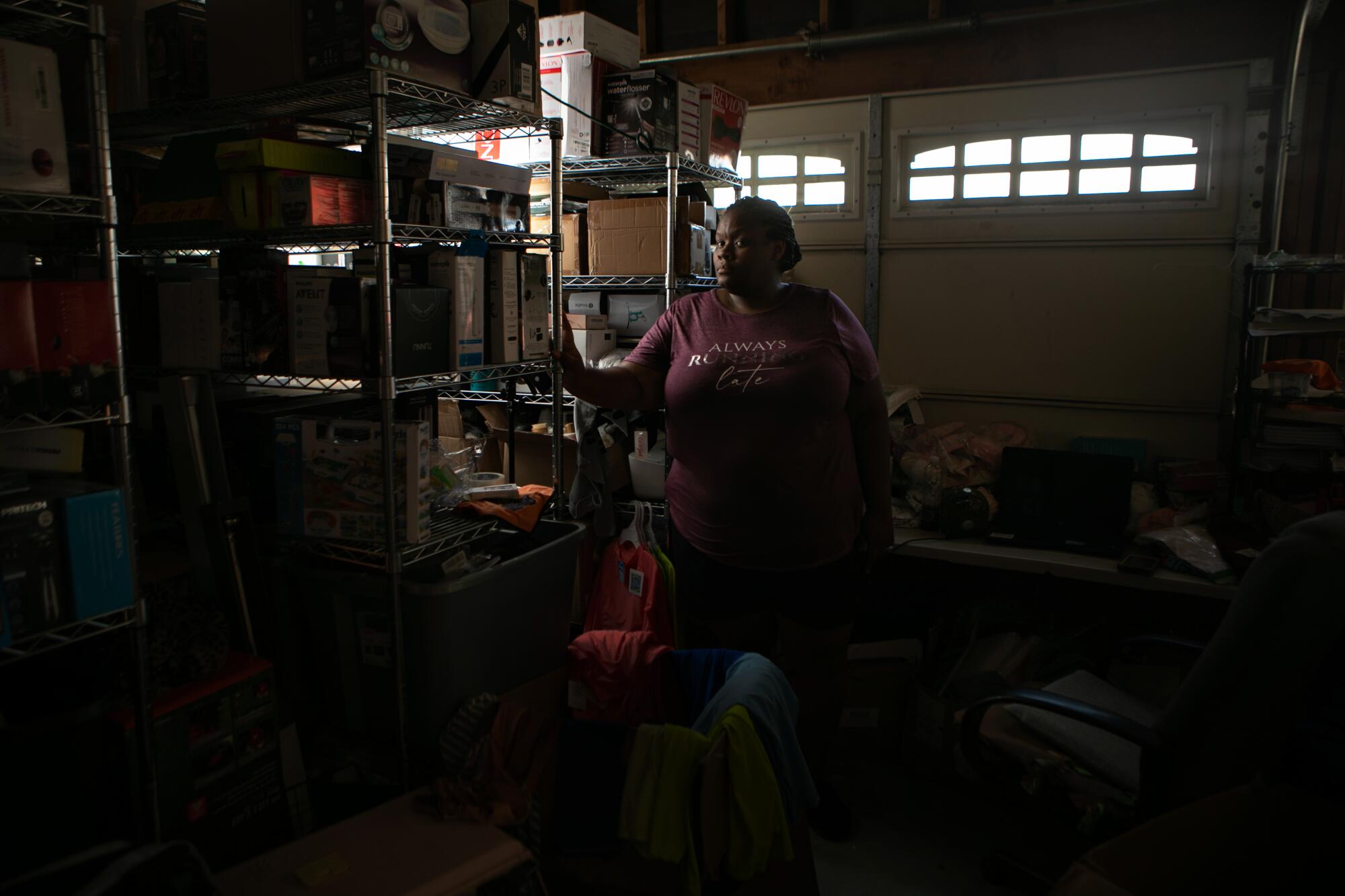
At her two-story home on a Moreno Valley cul-de-sac, Regina McCorkle described how, at the end of each Ryder shift, employees would be placed on the following day’s schedule. But the next morning she and other Black assembly workers would often find themselves dropped from the list.
Excluded workers would line up on standby. “You couldn’t clock in,” the 40-year-old mother of seven said. “If there were five Hispanics waiting and 10 Blacks, they’d pick the Hispanics first.”
McCorkle complained to six Ryder and Kimco managers — all Latinos — about bias and slurs, she said. One dismissed the behavior as just part of the “culture.”
In an interview, the former Ryder Integrated Logistics employee reveals the hardship she faced.
After about a year, Ryder promoted McCorkle to a quality auditor job. But name-calling escalated. Latinos “seemed insulted that a Black woman was checking their work,” she said.
Within days of complaining yet again, McCorkle was fired for what Ryder said were “performance problems.” “No one ever told me about a mistake,” she said.
McCorkle was the first to file an EEOC charge. And within a month of EEOC’s lawsuit, 115 other Black workers came forward with similar allegations.
One was Leilani Turner, a 52-year-old former homecare nurse. In Ryder’s parking lot, she and other Black workers found their vehicles vandalized, she said.
“There would be milkshake all over our cars,” Turner said. “Our tires were flat. There would be urine on our tires.”
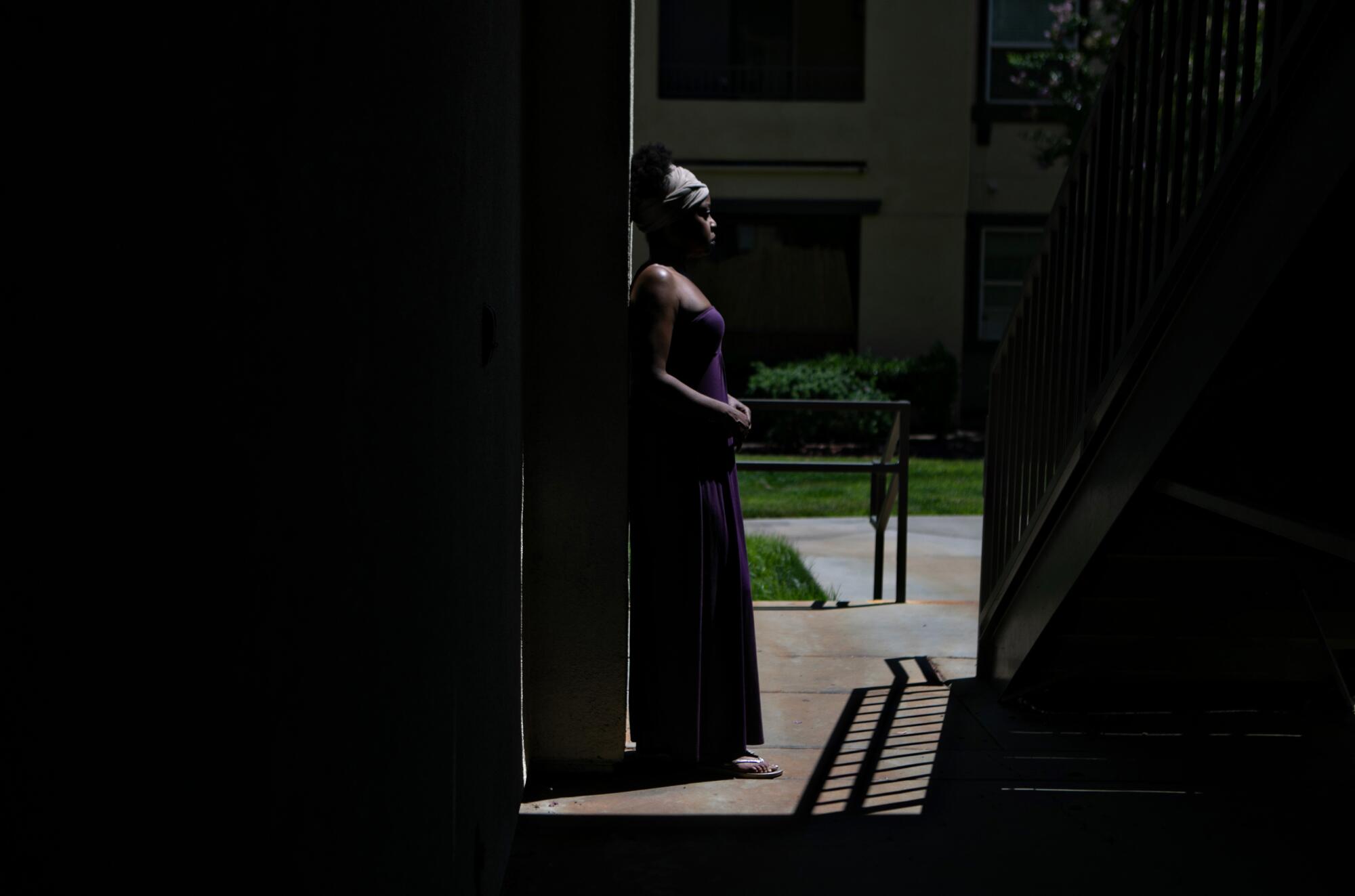
Turner asked managers for security camera footage. “They’d say, ‘Oh, it’s the angle of the camera, we can’t catch your car.’”
Finally, she got permission to park in another part of the lot, far from the workers’ entrance.
When Turner was promoted from assembler to shipping clerk, she said, managers neglected to give her the written manual that Latinos got to memorize inventory codes.
“They set you up to fail,” she said.
At five warehouses where Turner has worked over the years, “80% of workers were Hispanics, with a small portion of Caucasians and Black people,” she said. “The Hispanics stick together — they make sure their people get ahead.”
Was there white prejudice? Yes, but not from co-workers, she said, but from top managers who failed to respond.
“You shuffle me off like it’s no big deal,” Turner said. “You’re Caucasian, you don’t care.”
Federal and state officials often hold companies and their temp agencies to be “joint employers.” Executives can’t evade penalties by blaming their staffing firms, said the EEOC’s Park. “You don’t get to stick your head in the sand. You’re on the hook because you control the work.”
Staffing firms are also at issue in a sweeping lawsuit that California’s civil rights agency filed in February against Tesla on behalf of thousands of Black workers. The Department of Fair Employment and Housing cited a decade of complaints of discrimination and harassment at the electric-vehicle maker’s Fremont factory,
Racist slurs in English and Spanish were aimed daily at Black employees by co-workers and supervisors, and Black workers were given the most difficult physical jobs, the lawsuit alleges. Tesla hired most workers through 14 temp agencies “to avoid responsibility,” it asserted, and declined to investigate complaints from those workers.
Tesla called the suit “misguided,” saying the company “strongly opposes all forms of discrimination and harassment.”
In a separate case, a federal judge in San Francisco in April ordered Tesla to pay a Black elevator operator $15 million after a jury found his Mexican American supervisor had taunted him with graffiti depicting a large-lipped figure with a bone in his hair, while co-workers frequently called him N-words and other epithets in English and Spanish.
A 2021 Times investigation found a pattern of complaints alleging harassment and bullying of women at the Metropolitan Water District of Southern California. In a report Thursday, state auditors recommended legislation to ensure fair hiring, an independent ethics office and that the agency overhaul its sexual harassment policies.
Warehouses and factories are not the only targets. In the last five years, a swath of California employers including a UCLA hospital, a Central Valley vegetable farm, a San Diego college and a Riverside County skilled nursing facility have faced lawsuits over harassment and discrimination against Black employees by Latino co-workers and supervisors.
Lawsuits also target hiring policies. In the last three years, two large Latino-owned businesses, a Fresno ice cream maker and a San Jose cheese manufacturer with factories in California and eight other states, paid settlements after EEOC investigations alleging they refused to employ non-Latinos.
Six million Americans identify as Afro-Latino, 12% of the adult Latino population, and they are more likely than non-Black Latinos to experience discrimination, according to a Pew study this year.
While other Black workers at Cardinal and Ryder said they understood just a few Spanish slurs — and in some cases, none — Barry Bryant, 41, son of a Puerto Rican father and an African American mother, took in much more as he worked at Cardinal Health.
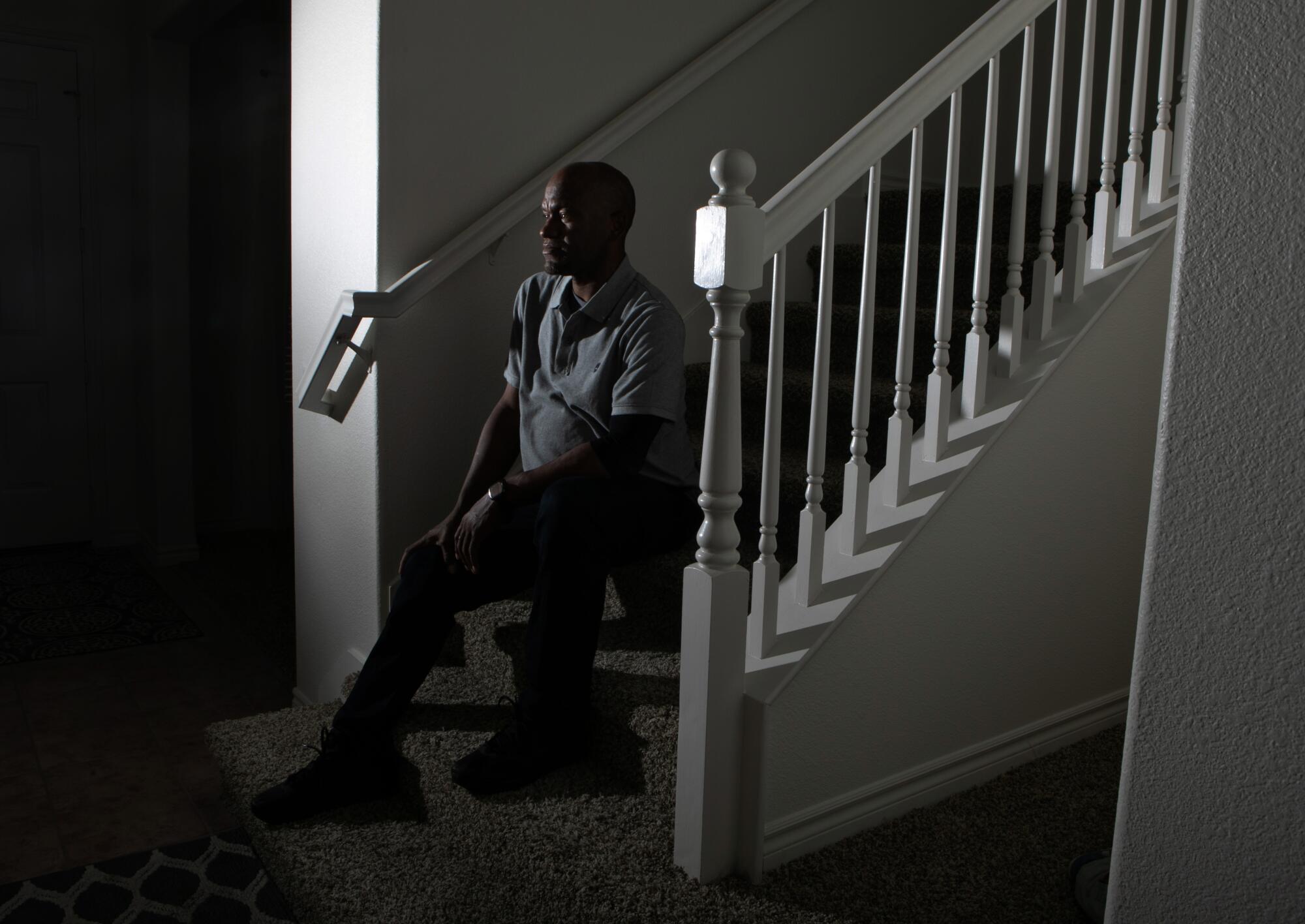
“Their nickname for me was ‘pinche mayate,’ f—ing June bug,” he said. “The first time I heard it, I almost snapped.” Supervisors would call to him, “Hey negrito,” Black boy. “I’d say, ‘Dude, my name is Barry.’” Latinas two feet from his workstation chatted in Spanish about Black people “saying, ‘Why is their hair so funky and nasty? They smell because they’re Black,’” he said. “It was just vile.”
Like Simmons, Bryant had been hired by AppleOne to drive a cherry picker. But despite having three certificates for the job, he was relegated to manual labor on the loading dock.
He asked a Latino supervisor when he would get to drive. “He laughed and said, ‘Trust me, never,’” Bryant recalled.
After Bryant filed written grievances with Cardinal and AppleOne over N-word harassment and noose graffiti, a Latina HR official responded, “Man, are you actually doing work or just busy about the gossip?” he said.
Barry Bryant, a former Cardinal Health worker, reveals the discrimination he experienced on the job.
Days after Bryant’s last complaint, the HR official told him as he arrived at work that AppleOne assignments, including his, were ended. And then she waved in four non-Black Latinas he had just seen at the AppleOne office, he said.
Recounting his experience, Bryant wiped his eyes. “Cardinal made me feel worthless,” he said.
Today, Bryant is on disability with kidney disease, cared for by his Mexican American girlfriend, a postal worker.
As for the EEOC settlement, “It would be nice financially if something did fall my way,” he said. But mainly he hopes his former co-workers and managers will be “be retrained and taught how to be human beings more than anything.”
More to Read
Inside the business of entertainment
The Wide Shot brings you news, analysis and insights on everything from streaming wars to production — and what it all means for the future.
You may occasionally receive promotional content from the Los Angeles Times.

